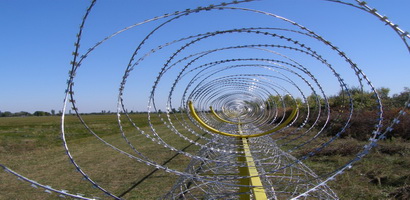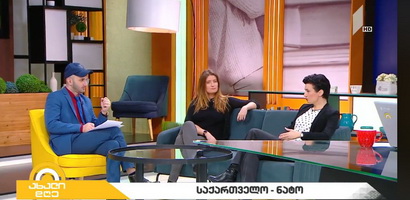
Russian soldiers have moved the de facto border with South Ossetia to 300 meters deep in the village of Ditsi and Dvani, which lie in a hilly area south west of Tskhinvali.
Russian border guards began demarcation works in several Georgian villages in the border area of Shida Kartli region. Border pillars are being installed now, and barbed wire is planned to be installed. As local residents admit occupants had been made wires between Eredvi until now. Russians led by former Autonomous Region maps. At the time of Soviet rule, Eredvi has been the part of the autonomous region, but before the August war it was under control of Georgian government. After the war, Eredvi has been occupied.
The new so called frontier has made the biggest problems for local residents, most of them have already left the residence, there are 18 houses 100 meters away from the border, only 10 family remains in place. People live in fear, trying to avoid children running out of the yard, as they may be kidnapped by Russian border guards. There are fruit gardens between the border and the houses, more than half of the trees dry, people keeping themselves by cultivating different vegetable crops, but because of not having irrigation system crops have already been half-destroyed. Portion of Channels have been left of the Russian-occupied territory and another portion needs to be repaired. Irrigation water is restricted, residents get it once in 2 days for an hour, the whole village suffers from this problem. Local residents have problem of drinking water too, they get drinking water for several hours during the day, so they have to keep a stock. Local population is afraid, that their land parcels and cemetery will be found on the other side of the 'border'. Some locals say that the line was moved by few hundred meters and they will no longer be able to use the land beyond newly installed fences as pasture. In addition, there is a danger of kidnapping, people do not have "freedom of movement", which is one of the main priorities of the EU Monitoring Mission in Georgia.
Georgian government made rapid react about border movement process, but public sentiment about this reaction has been divided, some of them believe that the government had to be much more strict and they must not go on concession with Russia, but another part thinks that aggression must not be answered with aggression, as Georgia has such kind of experience already and as a return got occupation of territories.
Prime Minister Bidzina Ivanishvili made no "hard decisions" as he admitted, about facts developed in Tskhinvlai. He said, that problems should be resolved through diplomatic means, and enhanced supervision. Primary task is to help the locals, he also talked about the raising number of monitors and police on territory to protect citizens.
Government must be more severe, suggests president of Georgia Mikheil Saakashvili, because, as a respond of the soft rhetoric, Russia, traditionally, reinforces its steps addressing to Georgia.
The most adequate, severe, diplomatic method to respond the fact, was a protest note, sent to Russian federation with help of Swiss embassy,
Also trying to get timely support and replies from international community Georgian government intensively provided information to foreign partners, that the Russian occupation forces in South Ossetia captured territory controlled by Georgia and this made problems for 40 families living near this borders.
The problem of wire movement in Tskhinvali region, along the occupation line, has been one of the main aspect of meeting held on 28-29 May by PACE President Jean - Claude Mignon, however he did not left a comment said that more information is needed to assess the situation.
The same topics were discussed in Strasbourg, on the Council of Europe Committee of Ministers meeting, where Secretary General Thorbjørn Jagland reviewed the issues related to the Consolidated Account of Georgia. At the Committee of Ministers, First Deputy Minister of Georgia Foreign Affairs - David Zalkaliani made a speech, he appealed Russia to adhere strictly the 2008 ceasefire agreement and to respect the fundamental human rights, including – "freedom of movement of people". Council of Europe the Committee of Ministers and representatives from European Union fully supported the position and they expressed worry, but the issue is more vital and residents have serious problems, these problems must be highlighted more acutely, to get timely response on incident and international organizations get adequate measures.
On May 31 in Ergneti "the Incident Prevention and Response Mechanism" working group meeting was held, at the very beginning, it was reported that the Georgian side was going to put strictly the boundary movement issue on the agenda of meeting and demand explenation from Russian side, but after meeting Ossetian side said that boundary issue was not raised by the Georgian side.
On June 2, non-governmental organizations went in the village of Ditsi, they say, after the fact became known, the border formation works has not been continued, at this time border movement process is stopped, but pillars are installed.
Despite the inappropriate format, the border movement issue has been raised at the meeting in Prague on 4 June. Russian Deputy Foreign Minister Grigory Karasin said, that measures will be taken to study the latest developments on the administrative border. because this format does not foresee detail examination of resembling issues, it was agreed that these questions will be asked at Geneva meeting said the Special Representative of the Prime Minister Zurab Abashidze said that because of this format does not foresee detail examination of resembling issues, it was agreed that these questions will be asked at Geneva meeting. Geneva meeting will be hold on June 26-27.
